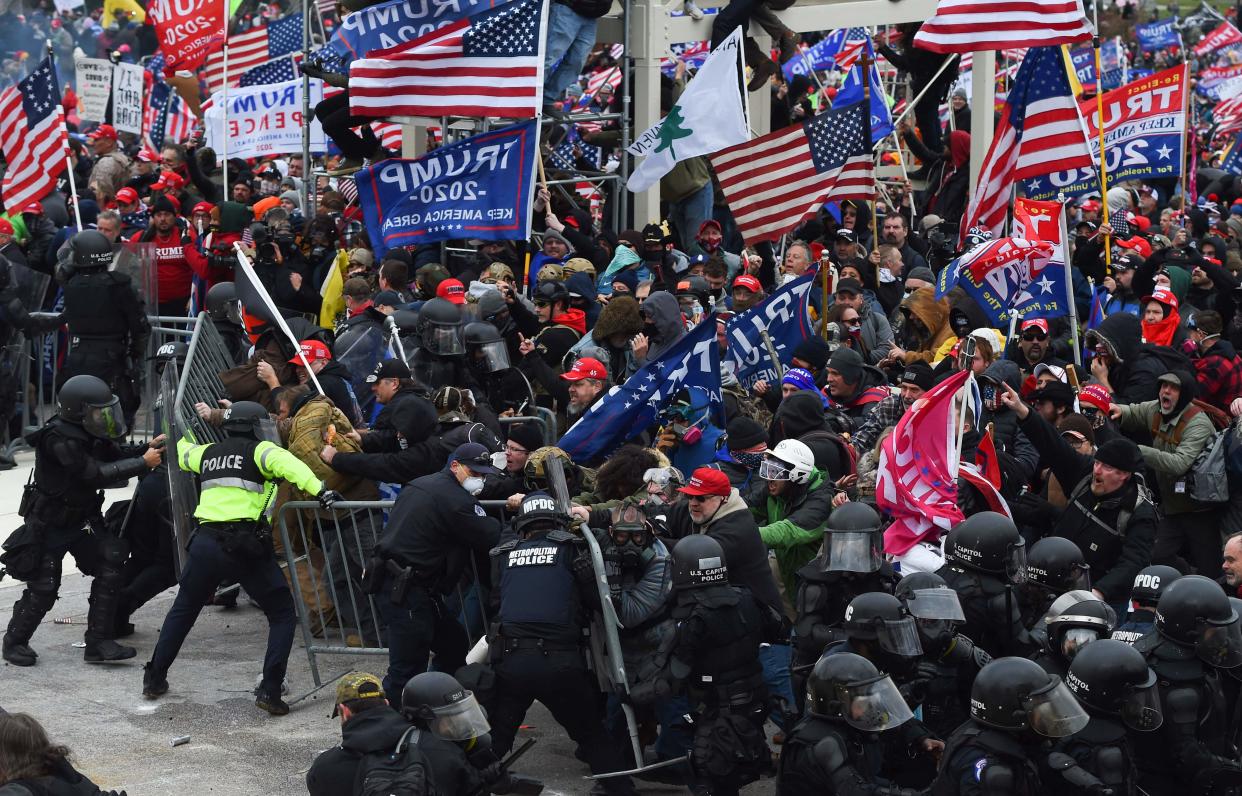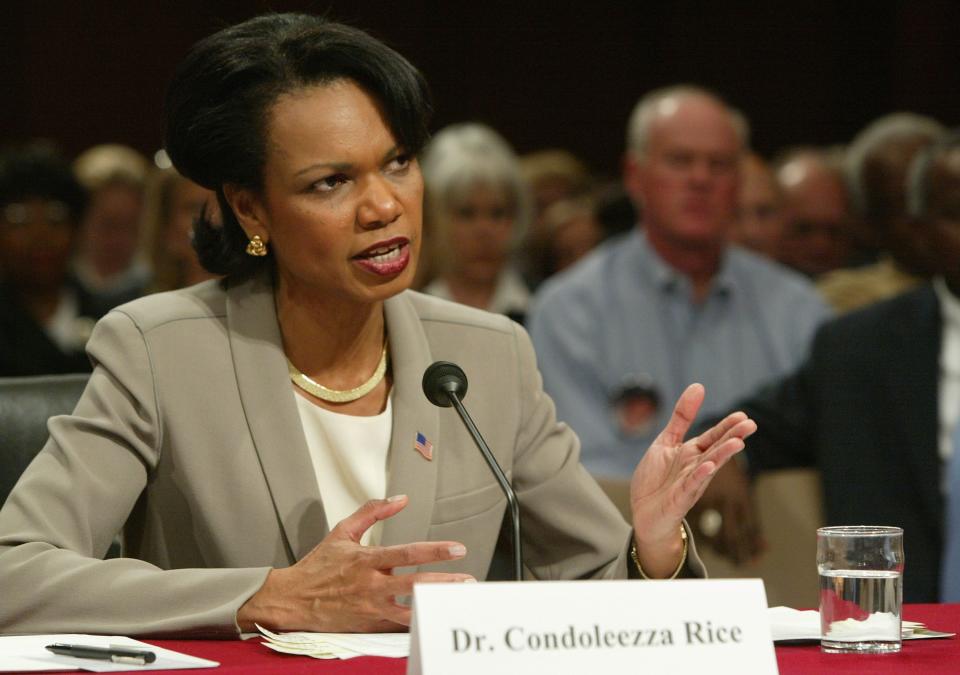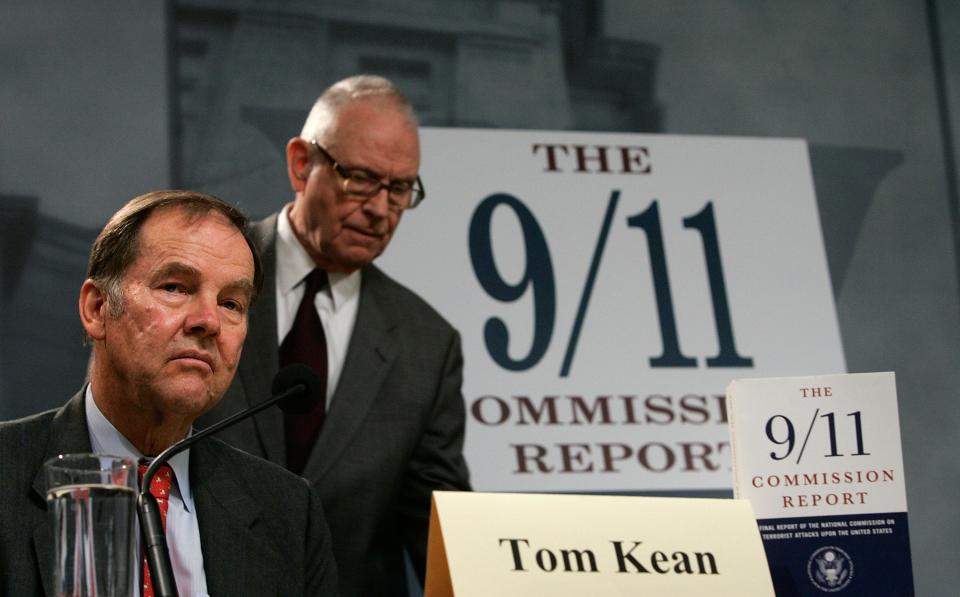January 6 Commission defeat previews dangerous failures to come on voting and elections

- Oops!Something went wrong.Please try again later.
- Oops!Something went wrong.Please try again later.
- Oops!Something went wrong.Please try again later.
The Bible says the truth will set you free. Leading Republicans say the truth could cost you elections and power, so the hell with it.
The successful Senate filibuster blocking an independent, bipartisan commission to investigate the deadly Jan. 6 attack on the Capitol should not be viewed as just another round of dysfunction. Barring shocking displays of procedural courage by Democrats or political courage by Republicans, it is a preview of massive failures to come in the project of trying to preserve American democracy.
“I’m deeply disappointed,” Rep. Lee Hamilton, a Democrat who was vice chair of the 9/11 Commission, told me. He called the Jan. 6 riot “a very dark day in the history of our country. We came very close to losing our republic and our form of government. Obviously Congress should investigate.”
Tragedy and fraught politics
“The country needs to clear the air” and learn the facts, former New Jersey Gov. Tom Kean, the Republican chair of the 9/11 Commission, said in a separate interview. He said the many unanswered questions include how involved then-President Donald Trump was and why the Capitol was “so lightly defended.”
Congress is rushing forward without information, Kean said – spending money to “refortify” the Capitol, but that won’t matter if we don’t find out who the groups were and how they did it. In a democracy, he added, “you never keep yourself safe just by building walls.”
The 9/11 Commission was created in the wake of unimaginable tragedy and amid fraught politics. Some Democrats viewed George W. Bush as a president elected by the Supreme Court. Some Republicans worried about what would come out at the hearings.

Election Day 2004 was less than two years away by the time the commission was formed and started work, seven months away when national security adviser Condoleezza Rice was grilled on the famous "Bin Ladin Determined To Strike in US" briefing Bush received five weeks before the attacks, less than four months away when the commission released a report that reshaped laws, policies and our government. Now, Kean says, it is used as a college textbook.
Would the January 6 commission become a “political weapon” for Democrats to aim at Republicans? At least two GOP senators suggested it would. Would the evenly divided commission, negotiated by GOP Rep. John Katko at the direction of leadership, be “slanted and unbalanced”? Senate Minority Leader Mitch McConnell predicted it would.
Mark your calendar: January 6, 2025 could be the date American democracy dies
"Is there going to be politics in it? Heck, there's politics in everything we do around here," Alaska Sen. Lisa Murkowski told reporters a day before she and five other Republicans voted for the commission. She said decisions should not be made "for short-term political gain at the expense of understanding and acknowledging what was in front of us on January 6."

Any investigation can get off-track, Hamilton said, and added: “If you follow the argument of the opponents, we would never investigate anything.” That’s just what Kean fears. "If we can't do it for this one, can we do it for COVID?" he asks. "That's very sad."
When the 9/11 Commission was blocked in the House, "what knocked it loose were the families of 9/11. They knew they didn't have the facts," Kean said. Even now he marvels at their tenacity, their protests and how they showed up all 20 times he testified on Capitol Hill. They were ubiquitous and, he says, numerous, given that nearly 3,000 people were killed in those attacks.
The Capitol attack led to three police deaths and over 140 police injured. They are trying to pressure Congress, but they are a relatively small group. Lawmakers and aides were also terrified survivors of that day, but only some of them want to "rock the boat," as Murkowski put it when asked if her colleagues feared Trump's reaction to a "yes" vote and what might be revealed.
Filibuster foreshadows defeats
There have been plenty of commissions since November 2002, when Bush signed the law creating the 9/11 Commission, but none triggered by so momentous an event; none with existential stakes. The 1/6 Commission would have been an exception.
Kean, Hamilton, Murkowski and others still hold out hope for an independent, bipartisan investigation of some sort. "We must find a way to do this," Hamilton said. "We have to get to the bottom of it. If you don't understand what happened and why, how can you prevent it from happening again? The answer is, you cannot."
Block, not tackle: Senators swore to support America, not the filibuster. Kill it to save the January 6 commission.
And yet, with a filibuster rule in place, requiring a 60-vote supermajority to consider a bill in a Senate divided 50-50, you almost certainly cannot pass a bipartisan investigative commission – or election reforms, voting rights, ethics standards and other laws to safeguard democracy.
The 54-vote “defeat” of the 1/6 Commission mirrors another defeat on another theoretically bipartisan bill eight years ago. It was a few months after 26 children and adults were shot to death at Sandy Hook Elementary School in Newtown, Connecticut. Bereaved families looked on from the galleries as senators voted on whether to break a filibuster on a gun background check expansion bill sponsored by Democrat Joe Manchin and Republican Pat Toomey. It got 54 votes.
Count on the Senate to break your heart. Over and over again.
Jill Lawrence is the commentary editor of USA TODAY and author of "The Art of the Political Deal: How Congress Beat the Odds and Broke Through Gridlock." Follow her on Twitter: @JillDLawrence
You can read diverse opinions from our Board of Contributors and other writers on the Opinion front page, on Twitter @usatodayopinion and in our daily Opinion newsletter. To respond to a column, submit a comment to letters@usatoday.com.
This article originally appeared on USA TODAY: Capitol attack commission is only first Republican filibuster victory

